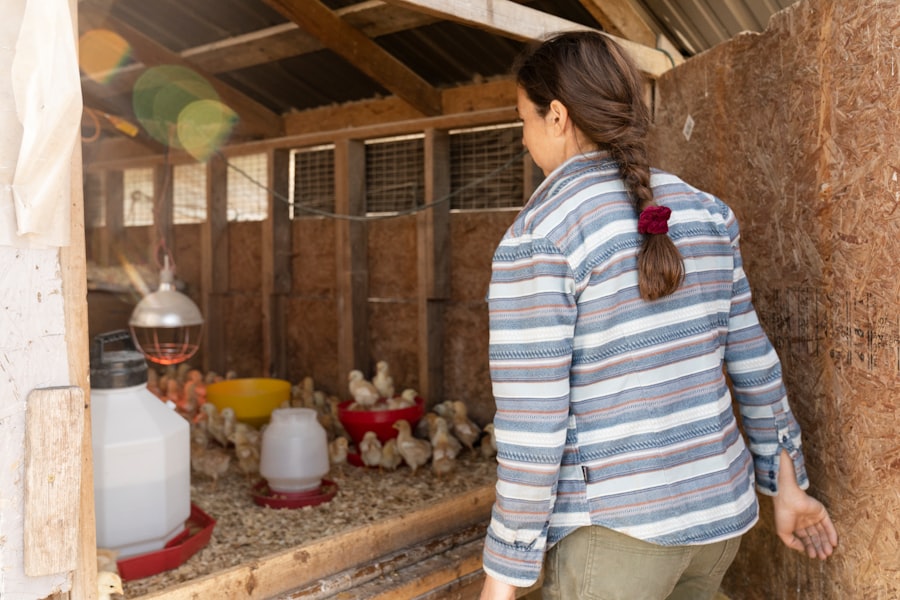Keeping guinea fowl with chickens is a popular practice among poultry enthusiasts. Guinea fowl, known for their unique appearance and loud calls, are often kept alongside chickens for a variety of reasons. Both guinea fowl and chickens are valuable for their eggs, pest control, and meat production, making them a complementary addition to any backyard or farm. However, there are important considerations to keep in mind when integrating these two species, including their differences in behavior, housing needs, and dietary requirements. In this article, we will explore the benefits and challenges of keeping guinea fowl and chickens together, as well as provide tips for successfully introducing guinea fowl to an existing chicken flock.
Key Takeaways
- Guinea fowl and chickens can be kept together, but there are important considerations to keep in mind.
- Guinea fowl are more independent and have different behaviors and needs compared to chickens.
- Keeping guinea fowl and chickens together can provide pest control, diversity in eggs, and protection benefits.
- Housing and feeding arrangements should accommodate the different needs and behaviors of guinea fowl and chickens.
- Potential challenges include aggression, disease transmission, and differences in social behavior between guinea fowl and chickens.
Differences Between Guinea Fowl and Chickens
Guinea fowl and chickens are distinct species with notable differences in behavior, appearance, and vocalizations. Guinea fowl are known for their striking spotted feathers, helmet-like casque on their heads, and loud, high-pitched calls that can be heard from a distance. In contrast, chickens come in a wide variety of breeds, each with its own unique plumage and vocalizations. Chickens are generally more docile and less vocal than guinea fowl, making them a popular choice for backyard poultry keeping. Additionally, guinea fowl are highly active foragers and have a strong instinct for pest control, often consuming large quantities of insects and ticks. Chickens also forage for insects but may not be as efficient at pest control as guinea fowl. Understanding these differences is crucial when considering the integration of guinea fowl and chickens, as their distinct behaviors and needs must be accommodated in a shared environment.
Benefits of Keeping Guinea Fowl and Chickens Together
There are numerous benefits to keeping guinea fowl and chickens together in the same environment. One of the primary advantages is pest control. Guinea fowl are renowned for their voracious appetite for insects, making them valuable allies in controlling pests such as ticks, flies, and mosquitoes. By allowing guinea fowl to roam freely alongside chickens, the overall pest burden on the property can be significantly reduced. Additionally, guinea fowl are excellent alarm animals, alerting the flock to potential threats such as predators or intruders with their loud calls. This can provide an added layer of security for the entire poultry flock, including the chickens. Furthermore, both guinea fowl and chickens are prolific egg layers, providing a diverse and abundant supply of eggs for consumption or sale. By keeping these two species together, poultry keepers can enjoy a varied selection of eggs with different flavors and nutritional profiles.
Another benefit of keeping guinea fowl and chickens together is their compatibility in terms of space utilization. Guinea fowl are highly active birds that prefer to roam over a wide area, while chickens are more inclined to stay close to their coop or designated area. This means that both species can coexist without competing for the same foraging space, allowing for efficient use of the available land. Additionally, guinea fowl and chickens have different preferences when it comes to nesting and roosting. Guinea fowl often prefer to roost in trees or elevated structures, while chickens typically roost in the coop at night. This difference in behavior reduces competition for roosting space and minimizes potential conflicts between the two species. Overall, the benefits of keeping guinea fowl and chickens together make them a valuable combination for any poultry enthusiast seeking a diverse and productive flock.
Considerations for Housing and Feeding Guinea Fowl and Chickens Together
When considering housing and feeding guinea fowl and chickens together, it is important to take into account the specific needs of each species. Guinea fowl are highly active birds that require ample space to roam and forage. They also have a strong instinct for roosting in trees or elevated structures, which should be accommodated in their housing setup. Providing access to trees or elevated perches can satisfy this natural behavior and prevent guinea fowl from roosting on top of chicken coops or other unsuitable locations.
In terms of feeding, guinea fowl have different dietary requirements compared to chickens. While both species consume a similar diet of grains, seeds, and insects, guinea fowl have a higher protein requirement due to their active foraging behavior. It is important to provide a balanced feed that meets the nutritional needs of both guinea fowl and chickens. Additionally, providing separate feeding stations can help prevent competition and ensure that each bird has access to an adequate amount of food.
When it comes to housing, it is essential to provide separate nesting areas for guinea fowl and chickens. Guinea fowl prefer to lay their eggs in secluded spots on the ground, while chickens typically use nesting boxes within the coop. By providing separate nesting areas, potential conflicts over nesting sites can be minimized, leading to a more harmonious cohabitation between the two species.
Potential Challenges of Keeping Guinea Fowl and Chickens Together
While there are many benefits to keeping guinea fowl and chickens together, there are also potential challenges that should be considered. One challenge is the difference in temperament between guinea fowl and chickens. Guinea fowl are known for their assertive and sometimes aggressive behavior, especially during the breeding season or when defending their territory. This can lead to conflicts with more docile chicken breeds, potentially resulting in injuries or stress within the flock.
Another potential challenge is the noise level produced by guinea fowl. Unlike chickens, which generally have a softer clucking sound, guinea fowl are known for their loud calls that can be disruptive to some individuals. This may be a consideration for those living in close proximity to neighbors or in urban areas where noise ordinances apply.
Additionally, integrating guinea fowl into an existing chicken flock can be challenging due to the different social structures of each species. Guinea fowl have a strong flock mentality and may initially struggle to integrate with an established chicken flock. This can lead to social conflicts and hierarchy struggles as the two species establish their pecking order within the shared environment.
Tips for Introducing Guinea Fowl to an Existing Chicken Flock

Introducing guinea fowl to an existing chicken flock requires careful planning and consideration to ensure a smooth transition for both species. One important tip is to introduce guinea fowl chicks or keets alongside chicken chicks at a young age. This allows the two species to grow up together and become accustomed to each other’s presence from an early age, reducing the likelihood of conflicts as they mature.
Another tip is to provide multiple feeding stations and water sources to prevent competition between guinea fowl and chickens. By ensuring that each bird has access to food and water without having to compete with the other species, conflicts can be minimized.
It is also important to monitor the integration process closely and be prepared to separate individuals if conflicts arise. Providing separate housing areas within the same enclosure can allow for a gradual introduction while minimizing potential conflicts between guinea fowl and chickens.
Overall, patience and careful observation are key when introducing guinea fowl to an existing chicken flock. By taking the time to acclimate both species to each other’s presence and providing adequate resources, a successful integration can be achieved.
Is Keeping Guinea Fowl with Chickens Right for You?
In conclusion, keeping guinea fowl with chickens can be a rewarding experience for poultry enthusiasts seeking a diverse and productive flock. The benefits of pest control, egg production, and space utilization make these two species valuable additions to any backyard or farm environment. However, it is important to consider the differences in behavior, housing needs, and dietary requirements when integrating guinea fowl and chickens.
While there are potential challenges to overcome, such as temperament differences and social integration issues, with careful planning and management, it is possible to successfully keep these two species together. By providing adequate space, separate housing areas, and monitoring the integration process closely, a harmonious cohabitation between guinea fowl and chickens can be achieved.
Ultimately, whether keeping guinea fowl with chickens is right for you depends on your specific goals, resources, and willingness to accommodate the needs of both species. For those seeking a diverse and dynamic poultry flock with added benefits such as pest control and security, integrating guinea fowl with chickens may be a worthwhile endeavor.
If you’re considering keeping guinea fowl with chickens, it’s important to understand the dynamics of integrating different poultry species. Poultry Wizard offers a helpful article on the benefits of using an A-frame chicken coop for housing both guinea fowl and chickens together. This resource provides valuable insights into creating a suitable environment for these birds to coexist harmoniously. Understanding the right coop design and management practices can contribute to a successful integration of guinea fowl and chickens in your poultry setup.
FAQs
Can guinea fowl and chickens be kept together?
Yes, guinea fowl and chickens can be kept together in the same coop and run. However, it’s important to introduce them to each other gradually and monitor their interactions to ensure they get along.
Do guinea fowl get along with chickens?
In general, guinea fowl can get along with chickens, but there may be some initial pecking order disputes. It’s important to provide enough space and resources for both species to minimize any potential conflicts.
What are the benefits of keeping guinea fowl with chickens?
Keeping guinea fowl with chickens can provide benefits such as pest control, as guinea fowl are known for eating insects and ticks. They can also serve as an early warning system for predators, alerting the chickens to potential threats.
Are there any drawbacks to keeping guinea fowl with chickens?
One potential drawback of keeping guinea fowl with chickens is that guinea fowl can be noisy, especially when they feel threatened or during mating season. Additionally, guinea fowl may be more flighty and wild compared to chickens, which can make them harder to handle.
What should I consider before keeping guinea fowl with chickens?
Before keeping guinea fowl with chickens, consider the space requirements, as guinea fowl and chickens both need ample space to roam and forage. Additionally, consider the temperament of your existing flock and whether they are likely to accept the addition of guinea fowl.
Meet Walter, the feathered-friend fanatic of Florida! Nestled in the sunshine state, Walter struts through life with his feathered companions, clucking his way to happiness. With a coop that’s fancier than a five-star hotel, he’s the Don Juan of the chicken world. When he’s not teaching his hens to do the cha-cha, you’ll find him in a heated debate with his prized rooster, Sir Clucks-a-Lot. Walter’s poultry passion is no yolk; he’s the sunny-side-up guy you never knew you needed in your flock of friends!







